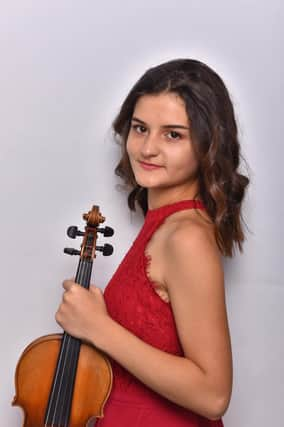Competition winner returns to perform with Eastbourne Symphony Orchestra


Tickets from WeGotTickets (£14); Reid and Dean, 43-45 Cornfield Road, Eastbourne BN21 4QG (£14; £12 for ESO Friends); or on the door (£15; £13 for ESO Friends).
The programme will be: Weber – Der Freischütz Overture; Bizet – Symphony in C; and Sibelius – Violin Concerto; under conductor Graham Jones and leader Lisa Wigmore.
Advertisement
Hide AdAdvertisement
Hide AdJelena will the playing the Sibelius, the piece with which she impressed in the competition.
As Graham says: “Sometimes when you hear a performance, you just know you are listening to something outstanding and that was the case with her performance and what is interesting is that she played the first movement of the Sibelius as part of what she did. She is now returning to do the whole of the concerto with the full orchestra. When she played back in February it was just with a piano accompaniment..
“She was very keen to do the Sibelius. We've done it fairly recently, in fact in the last concert we did before Covid which was in October 2019. It is a piece that I've worked on now a number of times and each time you come back to it with fresh eyes and discover something new.
“It's a romantic piece and it's a rhapsodic piece written in 1903 when he had completed his two symphonies. It has considerable technical challenges. Sibelius was a virtuoso violinist in his youth and that makes it one of the most rewarding pieces to do and also one of the most attractive for a young soloist. Soloists like to be challenged. We do give them a lead whenever it is possible but we do also weigh that against audience appeal. But we do think with the Covid break, the last time we did it really wasn't that recent at all. It seems a long time ago now.”
Advertisement
Hide AdAdvertisement
Hide AdGraham is pleased to say that he feels the orchestra is now back to pre-pandemic strength: “We lost one or two players but it was not more than that, and we have got a good programme to play here.
“We are doing the Bizet Symphony in C with the Sibelius which I think is a very good contrast. It was written when Bizet was only 17. It is very classical in its design but also very full of wonderful melodies but it was not really performed until 1935 since when it has become one of the staples.
“For the programme I think you want balance and contrast. The Sibelius has its dark side being partly influenced by the legend and mythology of Finland, but it is interesting because you tend to forget that Finland had been invaded by Russia and when Sibelius was writing this piece in 1903, it was very very much under Russian domination, a subject that people might be able to identify with now...”